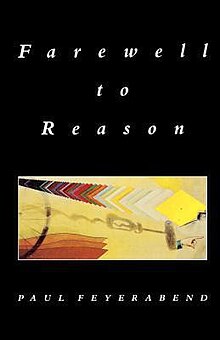
Falsifiability is a deductive standard of evaluation of scientific theories and hypotheses, introduced by the philosopher of science Karl Popper in his book The Logic of Scientific Discovery (1934). A theory or hypothesis is falsifiable if it can be logically contradicted by an empirical test.

Sir Karl Raimund Popper was an Austrian–British philosopher, academic and social commentator. One of the 20th century's most influential philosophers of science, Popper is known for his rejection of the classical inductivist views on the scientific method in favour of empirical falsification. According to Popper, a theory in the empirical sciences can never be proven, but it can be falsified, meaning that it can be scrutinised with decisive experiments. Popper was opposed to the classical justificationist account of knowledge, which he replaced with critical rationalism, namely "the first non-justificational philosophy of criticism in the history of philosophy".
Postmodern philosophy is a philosophical movement that arose in the second half of the 20th century as a critical response to assumptions allegedly present in modernist philosophical ideas regarding culture, identity, history, or language that were developed during the 18th-century Age of Enlightenment. Postmodernist thinkers developed concepts like difference, repetition, trace, and hyperreality to subvert "grand narratives", univocity of being, and epistemic certainty. Postmodern philosophy questions the importance of power relationships, personalization, and discourse in the "construction" of truth and world views. Many postmodernists appear to deny that an objective reality exists, and appear to deny that there are objective moral values.
The scientific method is an empirical method for acquiring knowledge that has characterized the development of science since at least the 17th century.
Pre-Socratic philosophy, also known as Early Greek Philosophy, is ancient Greek philosophy before Socrates. Pre-Socratic philosophers were mostly interested in cosmology, the beginning and the substance of the universe, but the inquiries of these early philosophers spanned the workings of the natural world as well as human society, ethics, and religion. They sought explanations based on natural law rather than the actions of gods. Their work and writing has been almost entirely lost. Knowledge of their views comes from testimonia, i.e. later authors' discussions of the work of pre-Socratics. Philosophy found fertile ground in the ancient Greek world because of the close ties with neighboring civilizations and the rise of autonomous civil entities, poleis.
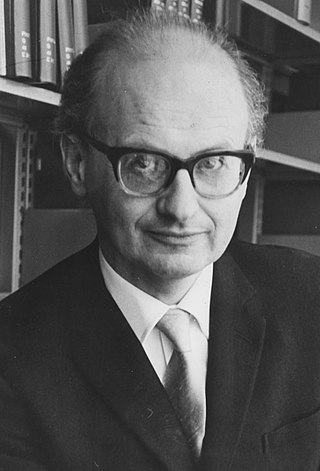
Imre Lakatos was a Hungarian philosopher of mathematics and science, known for his thesis of the fallibility of mathematics and its "methodology of proofs and refutations" in its pre-axiomatic stages of development, and also for introducing the concept of the "research programme" in his methodology of scientific research programmes.
Relativism is a family of philosophical views which deny claims to objectivity within a particular domain and assert that valuations in that domain are relative to the perspective of an observer or the context in which they are assessed. There are many different forms of relativism, with a great deal of variation in scope and differing degrees of controversy among them. Moral relativism encompasses the differences in moral judgments among people and cultures. Epistemic relativism holds that there are no absolute principles regarding normative belief, justification, or rationality, and that there are only relative ones. Alethic relativism is the doctrine that there are no absolute truths, i.e., that truth is always relative to some particular frame of reference, such as a language or a culture. Some forms of relativism also bear a resemblance to philosophical skepticism. Descriptive relativism seeks to describe the differences among cultures and people without evaluation, while normative relativism evaluates the word truthfulness of views within a given framework.
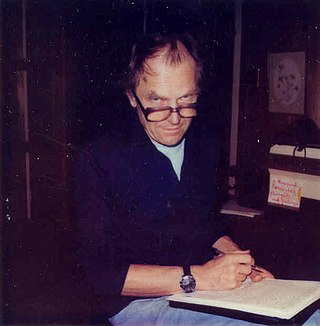
Paul Karl Feyerabend was an Austrian philosopher best known for his work in the philosophy of science. He started his academic career as lecturer in the philosophy of science at the University of Bristol (1955–1958); afterwards, he moved to the University of California, Berkeley, where he taught for three decades (1958–1989). At various points in his life, he held joint appointments at the University College London (1967–1970), the London School of Economics (1967), the FU Berlin (1968), Yale University (1969), the University of Auckland, the University of Sussex (1974), and, finally, the ETH Zurich (1980–1990). He gave lectures and lecture series at the University of Minnesota (1958-1962), Stanford University (1967), the University of Kassel (1977) and the University of Trento (1992).
Scientism is the view that science and the scientific method are the best or only way to render truth about the world and reality.
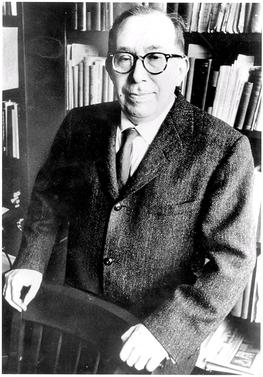
Leo Strauss was a 20th century German-American scholar of political philosophy. Born in Germany to Jewish parents, Strauss later emigrated from Germany to the United States. He spent much of his career as a professor of political science at the University of Chicago, where he taught several generations of students and published fifteen books.

Xenophanes of Colophon was a Greek philosopher, theologian, poet, and critic of Homer from Ionia who travelled throughout the Greek-speaking world in early Classical Antiquity.
In philosophy of science and epistemology, the demarcation problem is the question of how to distinguish between science and non-science. It also examines the boundaries between science, pseudoscience and other products of human activity, like art and literature and beliefs. The debate continues after more than two millennia of dialogue among philosophers of science and scientists in various fields. The debate has consequences for what can be termed "scientific" in topics such as education and public policy.
Commensurability is a concept in the philosophy of science whereby scientific theories are said to be "commensurable" if scientists can discuss the theories using a shared nomenclature that allows direct comparison of them to determine which one is more valid or useful. On the other hand, theories are incommensurable if they are embedded in starkly contrasting conceptual frameworks whose languages do not overlap sufficiently to permit scientists to directly compare the theories or to cite empirical evidence favoring one theory over the other. Discussed by Ludwik Fleck in the 1930s, and popularized by Thomas Kuhn in the 1960s, the problem of incommensurability results in scientists talking past each other, as it were, while comparison of theories is muddled by confusions about terms, contexts and consequences.

Hans Albert was a German philosopher. He was professor of social sciences at the University of Mannheim from 1963, and remained at the university until 1989. His fields of research were social sciences and general studies of methods. He was a critical rationalist, paying special attention to rational heuristics. Albert was a strong critic of the continental hermeneutic tradition coming from Heidegger and Gadamer.
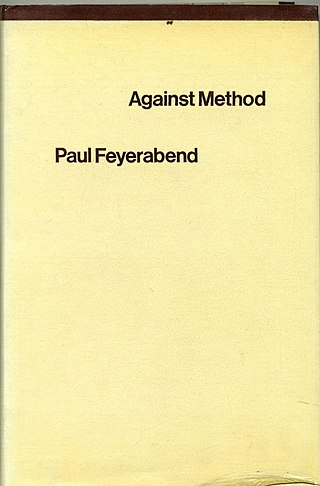
Against Method: Outline of an Anarchistic Theory of Knowledge is a 1975 book by Austrian philosopher of science Paul Feyerabend. The central thesis of the book is that science should become an anarchic enterprise. In the context of the work, the term "anarchy" refers to epistemological anarchy, which does not remain within one single prescriptive scientific method on the grounds that any such method would restrict scientific progress. The work is notable in the history and philosophy of science partially due to its detailed case study of Galileo's hypothesis that the earth rotates on its axis and has since become a staple reading in introduction to philosophy of science courses at undergraduate and graduate levels.
The unity of science is a thesis in philosophy of science that says that all the sciences form a unified whole. The variants of the thesis can be classified as ontological and/or as epistemic/pragmatic. There are also philosophers who emphasize the disunity of science, which does not necessarily imply that there could be no unity in some sense but does emphasize pluralism in the ontology and/or practice of science.
Factual relativism argues that truth is relative. According to factual relativism, facts used to justify claims are understood to be relative and subjective to the perspective of those proving or falsifying the proposition.

Hans-Joachim Niemann, is a German philosopher and PhD chemist, who has become known especially as a translator and editor of works by Karl Popper, including first editions and first translations. As a scholarly writer, he first published scientific papers, then many essays and several books on Karl Popper's philosophy and Critical Rationalism, including a 400-page Lexicon of Critical Rationalism. His Popper studies helped to establish Karl Popper as a major ethicist and as an important biophilosopher.

The Man of Reason: "Male" and "Female" in Western Philosophy is a book about the association between maleness and reason in western philosophy by the Australian philosopher Genevieve Lloyd. The work received positive reviews. It has been called a twentieth century classic of feminist thought, and is widely read in the Nordic countries.

Science in a Free Society is the 2nd full length book by the Austrian philosopher of science, Paul Feyerabend. It was published in 1978 by Schocken Books and later reprinted by Verso Books. While Feyerabend never published a second edition, Verso pressed four copies in 1982, 1983, 1985, and 1987.
